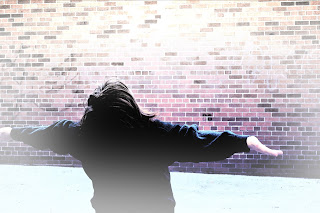This is Henri Rousseau's; The Sleeping Gypsy. It was made in 1897 with oil on canvas, it is 51.0 in x 79.0 in, and is currently in the museum of modern art, New York City.
I
do not think this painting did an acceptable job when it came to imitating
life, because it has more of a surreal feel to it, but obviously this was
intentional that the artist did this. Along with the surreal feeling, it also
seems a slight bit childish, since the way the artist made it, with the small
amount of detail and the art style it was painted in, makes it seem it was cut straight
out of a Claymation or paper-cut animated children’s TV show. Though maybe, the
only part of the picture that actually looks real is the gypsy’s feet, the
detail makes them look realistic, if you’d ask me.
I
believe with the unity of the elements and principles, the artist managed to
achieve that fairly well. The elements
that I can see in this picture are line, color, value, texture, some
asymmetrical balance, and emphasis.
In
this picture you can see lines in many different areas, such as; the gypsy’s
clothes, her hair/hat, her pillow, the lute, and the stick she is holding. All
of these create some steady lines, and some either curved or bumpy lines
throughout the picture.
The
different varieties of colors in this picture seem to create an eerie yet soothing
feeling. The mixture of warm and cool
colors all comes together to create that feeling. Take the background for
example, The mountains, the sky and the lake/land in the back, the majority of
that is cool colors, yet they have a gray tint to it, causing the eerie
feeling.
Next
is value. The parts in the picture that show as such is the lion and the gypsy.
The shadows beneath her give a better view that she is laying down. And the
lion, the shadows that are taking up the majority of its body makes it not only
seem creepy, but shows a good idea of the shadowing for the picture, and that
the artist used shadows in a really good way, since it darkens the front of the
gypsy and the lion, making the lion seem rather peculiar, and the gypsy serene
in her deep slumber.
Next
is texture. The things in the picture that made me wonder what it felt like was
the sand, and the lion’s mane. The sand
actually looks like I could really reach into the picture and run my fingers
through the sand, rubbing it between my fingers. And the lion looks like you could actually
feel its soft furry mane, since the separate brush strokes of varied colors and
shades made it look like real fur.
And
now we’re at the balance: The picture has a lot of asymmetrical balance, since
instead of being center; it’s more off to the right of the picture. Like the
lion and Gypsy, they are set off to the right of the picture, and the sand at
the front goes more to the right as well. In this picture there is rarely
symmetrical balance, since the background is more its own thing while the
foreground is off to the right.
With
Emphasis, the things your eyes are drawn to first are the lion and the gypsy,
since they hold the most color and value in the picture. While everything else
is mostly cool color, the gypsy and the lion have a warmer color, which makes
you look at them first, because they stand out more.
Finally,
when it comes to emotion, like I mentioned many times before, when you look at
this picture, you get a sense of eeriness and a calming feeling. Just earlier,
with all the principles and elements of design that this picture had, all
together it creates the feeling that it has. Though I’m not entirely sure what
message the artist was trying to get across, I do know that he was at least
trying the make that eeriness, and that with even just a person and an animal
in a desert, he can make it seem so surreal.



